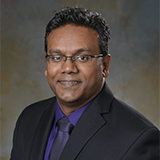Q: Who is likely to get COPD?
A: Smokers are the most likely to get COPD. Giving up smoking is the best way to decrease your risk. About 5 in 100 of people with COPD inherit a high risk for it from a parent. These people lack a certain protein that protects them from getting COPD, and they can get it even if they do not smoke.
Q: What symptoms and problems do people with COPD have?
A: Coughing up clear fluid every morning is the first symptom of COPD. As the disease worsens, people with COPD begin to have trouble breathing. They report feeling short of breath during their usual activities. Severe COPD can cause breathing trouble even while someone is at rest. Patients with severe COPD sometimes must go into the hospital for treatments. Patients may also need oxygen from a special tank at home. COPD causes your air passages to narrow. As this happens, you have to work harder to breathe air out of your lungs. The used air with carbon dioxide becomes "trapped" in the lung. The lungs struggle to breathe in fresh air with oxygen. Because of this, COPD makes it harder for you to do things like blow out a candle or climb a hill.
Q: How can my healthcare provider tell if I have COPD?
A: Your provider will have to do several tests. One of the most common is called spirometry. Sometimes this test is also called a pulmonary (lung) function test. A machine is used to find out how much air you can breathe in and breathe out in a short time. It can also measure how much air is in your lungs. This test can help find out the amount of damage to your lungs. Your healthcare provider may also do other tests to find out about different gases in your blood. Some tests may be repeated from time to time to find out if your COPD is getting worse and to find out if the treatment is helping you. Your healthcare provider then uses the results from these tests to decide if any changes need to be made to your medications or oxygen.
Q: If I have COPD, how can I learn to cope with my illness?
A: In most cases, some damage has already been done by the time your healthcare provider finds out you have COPD. You and your family should learn as much as possible about the disease and how to live with it. Your doctor can give you information about COPD education programs. People with COPD can help themselves by stopping smoking and avoiding secondhand smoke, dust, work-related fumes, air pollution, extreme heat, extreme cold, and high altitudes. They should also avoid contact with people who have colds or the flu. A healthy diet, an exercise program and regular contact with a healthcare provider are essential. Your visits will include regular spirometry tests and vaccinations against diseases that affect the lungs, such as pneumonia. It is very important that you talk to your healthcare provider first before beginning any exercise program. Doing the wrong type of exercises can make your COPD worse.
Q: What are the treatments for COPD?
A: There is no cure for COPD but it can usually be prevented by not smoking. Some patients with severe COPD need to have home oxygen from a special tank, which can help them live longer. Medicines and some other methods used to treat COPD include:
- Bronchodilators: These come in a spray you breathe in to help open your airways
- Steroids: These also come in a spray form and usually reduce swelling in your airway
- Antibiotics: These are used to treat infections
- Expectorants: These are used to help you cough up fluids in your airways
- Bullectomy: A type of lung surgery that removes trapped air bubbles in the chest, making it easier to breathe
- Lung Therapy: A supervised exercise program to strengthen the muscles that allow you to breathe, combined with other medical treatment
Q: What will happen to me if I get COPD?
A: A person with COPD can have breathing problems from time to time for many years. The life span of people with COPD is related in part to two things. One is how bad your lung function is when your healthcare provider first discovers you have COPD. The other is how fast it worsens after it is discovered. For example, people who have lost about two-thirds of normal lung function when they first find out they have COPD usually live for an average of about ten more years.
Q: Is a person ever “too old” to benefit from stopping smoking?
A: Quitting smoking can improve the health of your lungs at any age. We all lose some ability to move air into and out of the lungs as we age, but smokers of all ages lose lung function faster. Most often, smokers go on to develop breathing problems such as COPD at a younger age than non-smokers. Fortunately, if you stop smoking you can slow the damage to your lungs as you age. Because some of the lung damage cannot be cured, a smoker’s lungs are not likely to return to normal. A key to keeping healthy lungs is to stop smoking. The earlier the better—but better late than never.
Last Updated July 2019

